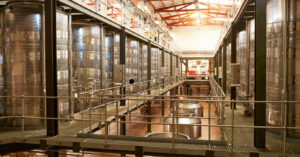Century Pacific Food, Del Monte may see impact from Trump tariffs, say analysts

THE 17% reciprocal tariff imposed by the United States on the Philippines could affect companies like Century Pacific Food, Inc. (CNPF) and Del Monte Pacific Ltd. (DMPL), according to analysts.
“Century Pacific Food, Inc.’s coconut business could be heavily impacted, as a significant portion of its clients’ sales relies on the US market,” Unicapital Securities, Inc. Research Head Wendy B. Estacio-Cruz said in a Viber message on Thursday.
In 2024, CNPF entered into a multiyear agreement to supply The Vita Coco Company, a US-based coconut product company, with 90 million liters of coconut water until 2029.
CNPF shares dropped by 4.34%, or P1.55, to P34.15 per share on Thursday following the announcement of the 17% reciprocal tariff on Philippine exports, part of US President Donald J. Trump’s “Liberation Day” tariff policy.
The Philippines currently imposes a 34% tariff on US goods. An annex to Mr. Trump’s executive order, posted on the White House website, shows an adjusted tariff rate of 18% for the Philippines, which will take effect on April 9.
“Most of our listed companies export to China and ASEAN (Association of Southeast Asian Nations), and we don’t really have any listed companies that derive significant income from the US aside from JFC and Del Monte Pacific Ltd.,” AP Securities, Inc. Research Head Alfred Benjamin R. Garcia said in a Viber message.
Del Monte Foods Holdings Ltd. generated approximately $1.73 billion in sales in the US for the period ending April 30, 2023, according to its consolidated financial statements.
DMPL shares were unchanged at P3 per share on Thursday.
“For JFC (Jollibee Foods Corp.), the pinch may come in the form of rising inflation in the US, which could eat into its margins,” Ms. Estacio-Cruz said.
As of March 12, 2025, Jollibee reported operating 76 stores across 14 US states. In addition to its flagship Jollibee brand, the company manages other brands in the US, including Chowking and Red Ribbon.
JFC shares fell by 3.11%, or P7.20, to P224 per share on Thursday.
Alvin D. Lao, president and chief executive officer of listed specialty food ingredients and oleochemicals company D&L Industries, Inc., said in a Viber message that the company is unfazed by the tariffs.
“Since D&L is a big importer, we can also benefit when more suppliers stop selling to US customers and (instead) sell to us. This refers to the raw materials that we import,” he said.
He added that the company’s exports to the US are less than 3% of its revenue and are also sellable to other markets.
“These are mostly high-margin specialty products with unique functional and technical properties, highly sought after and in high demand, so buyers are not as price-sensitive,” Mr. Lao said.
D&L stocks fell by 1.67%, or P0.09, to P5.31 per share on Thursday following the tariff announcement.
“Even though the US is our largest export destination, it still accounts for only around 16% of our total exports as of February 2025. Our participation in the Regional Comprehensive Economic Partnership free trade deal, which includes ASEAN, China, South Korea, Japan, Australia, and New Zealand, gives us plenty of other large markets for our exports,” AP Securities’ Mr. Garcia said.
“Industries that may be negatively affected by these tariffs are electronics, manufacturing, agriculture, and automotive, among others. Aside from these, the trickle-down effect of these tariffs could extend beyond just exporters. Local manufacturers that rely on imported raw materials from the US may also face increased costs,” Unicapital’s Ms. Estacio-Cruz said.
The direct impact of tariffs on most listed companies will “probably be limited,” China Bank Capital Corp. Managing Director Juan Paolo E. Colet said in a Viber message.
“The additional tariffs are generally seen as negatively impacting our goods exporters to the US, though perhaps not as bad as initially feared because we have the lowest rate among our emerging market peers…” he added.
Mr. Trump’s tariff for the Philippines is lower compared to neighbors such as Cambodia (49%), Laos (48%), China (34%), and Indonesia (32%).
Data from the Philippine Statistics Authority showed that the US remained the top destination for Philippine-made goods, with exports valued at $12.14 billion or 16.6% of total export sales.
Rizal Commercial Banking Corp. Chief Economist Michael L. Ricafort said in a Viber message that the reciprocal tariff is expected to have a limited impact on the Philippines.
“Other ASEAN and Asian countries with higher US import tariffs could look for alternative export markets such as more exports to the Philippines,” he said.
Meanwhile, Mr. Colet said in a Viber message that the reciprocal duties could position the Philippines as an alternative base for foreign companies.
“We see a potential silver lining. The new US reciprocal tariff regime presents an opportunity for us to position the Philippines as a competitive export base to attract foreign companies,” Mr. Colet said.
“To do that effectively, we need to redouble efforts to lower energy costs, improve infrastructure, and enhance the ease of doing business,” he added. — Revin Mikhael D. Ochave











